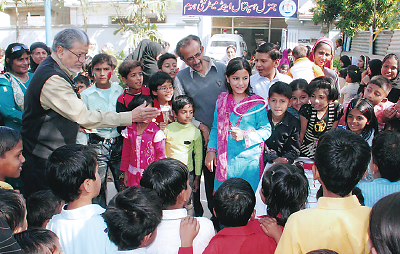AACAP Gives Top Award to Husain for Work With Traumatized Youth
Abstract
Syed Arshad Husain, M.D., has trained thousands of mental health professionals, teachers, mothers, and others to help children affected by conflict and disaster.
The American Academy of Child and Adolescent Psychiatry (AACAP) will honor Syed Arshad Husain, M.D., later this month with its annual Catcher in the Rye Award, given for his advocacy on behalf of young people.

Child psychiatrist Syed Arshad Husain, M.D. (left), joins students at a fundraising event in 2010 for the Mothers as Teachers School he founded in Karachi, Pakistan, in 2005.
Over his career, Husain, now a professor emeritus of psychiatry and child health at the University of Missouri-Columbia, developed innovative methods of caring for children affected by the trauma of conflict and natural disasters.
“I’ve known about his work for years, and I know that he is a tireless advocate for traumatized children and their families in war zones,” said AACAP President Paramjit Joshi, M.D., division chief of Psychiatry and Behavioral Medicine at Children’s National Medical Center in Washington, D.C.
Husain’s work has focused on educating those closest to children, like teachers and mothers, to observe and better care for those in their charge.
His “Teachers as Therapists” model trained educators in war zones and disaster areas to identify symptoms of exposure to trauma and then provide some useful interventions. This program has been adapted for use in 18 countries and has trained 6,000 teachers thus far.
The inspiration for the teachers’ program was the war in the former Yugoslavia in the 1990s.
“The five-year siege of Sarajevo was the longest in its history,” recalled Husain in a recent interview. “More than 230,000 people were killed, and there were 60,000 children trapped in the city with only 100 mental health professionals, so I thought we should train other people.”
Husain and his colleagues visited Bosnia and Hercegovina a total of 25 times from 1994 to 1999, sometimes as it was being shelled. They trained teachers and mental health professionals to help more than 20,000 children exposed to the trauma of a brutal war.
“We would go for two or three weeks, train people, then go back a few months later for follow-up and more training,” he said. Training included ways to identify common stress reactions or symptoms of depression and how to apply group techniques like storytelling, relaxation therapy, art therapy, and play therapy.
Eventually, the dean of Missouri’s medical school suggested that the team invite groups of teachers and mental health professionals to Columbia to train and also to get a respite from the fighting at home.
In this country, he and his colleagues helped create a similar, school-based program in Joplin, Mo., after a devastating tornado in 2011. They also trained teachers and therapists to work with children affected by the Oklahoma City bombing in 1995, as well as those displaced from New Orleans after Hurricane Katrina.
After the 1995 earthquake in northern Pakistan, Husain established a tent village for orphaned children and trained their teachers in elements of disaster mental health.
Husain also developed a “Mothers as Teachers” program in a poor section of Karachi, Pakistan. The mothers were trained to teach half a dozen children each in classrooms built next to their houses. The women are paid for their time, and the students get scholarships if they attend regularly. A follow-up study found that 96 percent of the students have gone on to secondary school.
“I hope that other communities will pick up on that model while keeping the stringent standards and discipline,” he said. To expand his work, he founded the International Medical and Educational Trust.
Husain was born in Delhi, India, and moved with his family to Pakistan after the partition of 1947. He graduated from Dow Medical College in Karachi in 1962, trained in psychiatry at the Maudsley Institute in London at McGill University in Montreal, and joined the University of Missouri’s psychiatry department in 1969. During his tenure there, he served as chief of child and adolescent psychiatry and directed the child fellowship program. He became a professor emeritus in 2009 but remains active.
He also received the Bruno Lima Award from APA in 1996 for his contributions to disaster psychiatry and is a former member and chair of APA’s Committee on the Psychiatric Dimensions of Disasters.
“Arshad is one of those people you look up to in our profession,” said Joshi. “They have such humility and contribute in a really remarkable way to the well-being of children all across the world.” ■
Information about the International Medical and Educational Trust, founded by Syed Arshad Husain, M.D., can be accessed here.



